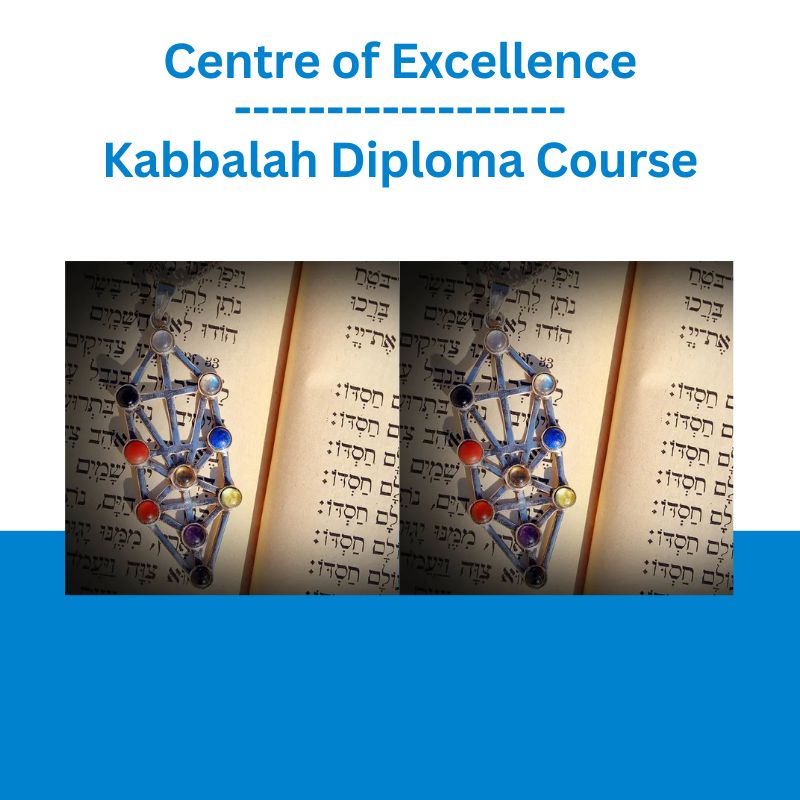*** Proof of Product ***
Exploring the Essential Features of “Centre of Excellence – Kabbalah Diploma Course”
What Will You Learn?
Kabbalah seeks to define the nature of the universe and the human being, the nature and purpose of existence, and various other questions relating to the nature of being. It also presents methods to aid understanding of these concepts and thereby attain spiritual realisation. The Kabbalah Diploma Course guides you on your first steps on the road to higher wisdom.
Beginning with an introduction to the subject, the Kabbalah Diploma Course explains why we should study Kabbalah, the different forms it takes, and its main concepts.
Building on this foundation you’ll go on to learn the origins of Kabbalah, from both traditional and historical accounts, and explore the work of some of the most famous Kabbalists. You’ll look at important Kabbalistic texts, starting with the Torah, and moving on to the Zohar, Sefer Yetzirah, Sefer ha-Bahir, Sefer ha-Temunah, Sefer Raziel, and finishing with the Sefer HaRazim.
You’ll examine a number of Kabbalistic concepts, including the concept of Ein Sof and creation, and the process of Creation and its aftermath, Adam Kadmon (the primordial man), and the palaces within the Four Worlds. The Kabbalah Diploma Course details the concept of the Tree of Life and explains the sequence of the sefirot, the 32 Paths of Wisdom and the meanings of each sefirot. You’ll also explore the Tree of Death, the counterpart to the Tree of Life, the concepts of reincarnation, the soul’s journey in relation to Kabbalistic thought, and heaven and hell.
You’ll learn about gematria, a form of numerology used within Kabbalah. Also covered are the 72 names of God and the angels derived from these names, the orders of angels and the relationships between the archangels and the sefirot, along with a brief discussion on demons and an outline of some of the major demons.
Following the Kabbalah Diploma Course, you’ll discover astrology and how it relates to Kabbalah, especially the relationships between the planets and the sefirot. You’ll also learn how you can understand tarot cards through Kabbalah, as the course explains the Four Worlds, the Minor Arcana and the sefirot, the Major Arcana and the paths of the Tree of Life, and the meanings of number and symbolism on the cards, from the Kabbalistic point of view.
Course Syllabus
What will I learn on the course?
Module 1 – What is Kabbalah?
7 parts
Introduction
Part 1: The Origins of Kabbalah
Part 2: Types of Kabbalah
Part 3: Main Concepts of Kabbalah
Test Your Knowledge
Key Learning Points Exercise
Module 1 Assessment
Module 2 – The History of Kabbalah
8 parts
Part 1: Origins of Kabbalah
Part 2: Medieval Period
Part 3: Early Modern Period
Part 4: Eighteenth and Nineteenth Centuries
Part 5: Twentieth Century
Test Your Knowledge
Key Learning Points Exercise
Module 2 Assessment
Module 3 – Texts
7 parts
Part 1: The Torah
Part 2: The Zohar
Part 3: Sefer Yetzirah and Sefer Ha Bahir
Part 4: Sefer Ha-Temunah, Sefer Raziel HaMalakh and Sefer HaRazim
Test Your Knowledge
Key Learning Points Exercise
Module 3 Assessment
Module 4 – Ein Sof and Creation
6 parts
Part 1: Ein Sof and Creation
Part 2: Aspects of Creation I
Part 3: Aspects of Creation II
Test Your Knowledge
Key Learning Points Exercise
Module 4 Assessment
Module 5 – The Four Worlds
6 parts
Part 1: What are the Four Worlds?
Part 2: Adam Kadmon
Part 3: The Four Worlds and Sheva Hekhalot
Test Your Knowledge
Key Learning Points Exercise
Module 5 Assessment
Module 6 – The Tree of Life
8 parts
Part 1: The Tree of Life
Part 2: 32 Paths of Wisdom
Part 3: Sefirot
Part 4: Partzufim
Part 5: Tree of Death
Test Your Knowledge
Key Learning Points Exercise
Module 6 Assessment
Module 7 – Gilgul: Reincarnation and the Soul
6 parts
Part 1: Gilgul: Reincarnation and the Soul
Part 2: Heaven and Hell
Part 3: Voyage into the Afterlife, Reincarnation and Resurrection
Test Your Knowledge
Key Learning Points Exercise
Module 7 Assessment
Module 8 – Word and Number: Angels and Demons
10 parts
Part 1: Words and Numbers
Part 2: Gematria
Part 3: The Names of God
Part 4: The 72 Angels
Part 5: Orders of Angels
Part 6: Archangels and the Sefirot
Part 7: Demons
Test Your Knowledge
Key Learning Points Exercise
Module 8 Assessment
Module 9 – Kabbalah and Astrology
6 parts
Part 1: Kabbalah and Astrology
Part 2: The Zodiac
Part 3: Planets and Sefirot
Test Your Knowledge
Key Learning Points Exercise
Module 9 Assessment
Module 10 – Kabbalah and Tarot
13 parts
Part 1: Introduction to Tarot Cards
Part 2: The Four Worlds
Part 3: The Minor Arcana and the Sefirot
Part 4: Paths on the Tree of Life
Part 5: More about Numbers
Part 6: Kabbalistic Symbols on the Cards
Conclusion
Appendix 1: Extracts from the Zohar
Appendix 2: Sepher Yetzirah or the Book of Creation W W Wescott, tr.
Appendix 3: Extract from the Sefer Ha Bahir
Test Your Knowledge
Key Learning Points Exercise
Module 10 Assessment
Who Would Benefit from This Course?
A set of esoteric teachings meant to explain the relationship between an unchanging, eternal, and mysterious Ein Sof (the Creator, God, infinity) and the mortal and finite universe (the Creator’s creation), Kabbalah is a rich and rewarding study suited to anyone interested in deepening their spiritual wisdom.
Accreditations
The Quality Licence Scheme is part of the Skills and Education Group, a charitable organisation that unites education and skills-orientated organisations that share similar values and objectives. With more than 100 years of collective experience, the Skills and Education Group’s strategic partnerships create opportunities to inform, influence and represent the wider education and skills sector.
The Skills and Education Group also includes two nationally recognised awarding organisations; Skills and Education Group Awards and Skills and Education Group Access. Through their awarding organisations they have developed a reputation for providing high-quality qualifications and assessments for the education and skills sector. They are committed to helping employers, organisations and learners cultivate the relevant skills for learning, skills for employment, and skills for life.
Their knowledge and experience of working within the awarding sector enables them to work with training providers, through the Quality Licence Scheme, to help them develop high-quality courses and/or training programmes for the non-regulated market.
Please see the full list of alternative group-buy courses available here: https://lunacourse.com/shop/










 Centre of Excellence - Quantum Physics Diploma Course
Centre of Excellence - Quantum Physics Diploma Course